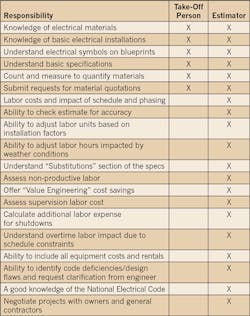Finding the right person for your estimating department can be challenging. Whether you are looking for an estimator, a chief estimator, or an entry-level employee, you must match a person’s skill with the most appropriate position. A high-quality employee possesses business and technical skills, a good work ethic, honesty, and, most of all, potential. You won’t be able to mold an employee into a key member of your estimating team if he or she doesn’t have potential.
Employees must possess the proper skills and understanding of their responsibilities as team members. Employees are usually compensated per their skill and ability. The greater the skills and abilities, the greater the compensation. A happy employee is one whose compensation matches his or her abilities. A happy contractor is one whose employees’ responsibilities match their skill and ability. When an employee has responsibilities but doesn’t possess the skills to fulfill them, this can lead to disaster.
Having a detailed job description for each position in your department will help you hire the right person for the appropriate position. For example, knowing the difference between an estimator and a take-off person is vital. Hiring someone as an estimator with the skills of a take-off person will lead to frustration for you and the employee.
A take-off person is no more an estimator than an electrical worker is an electrician. Some companies refer to an entry-level employee in their estimating department as a “junior estimator” and the experienced seasoned estimator as a “senior estimator.” A take-off person trying to function as an estimator is costly — very costly.
Let’s consider the difference between an electrical worker and an electrician. An electrical worker is one who can install electrical equipment when given the proper tools, materials, and information. An electrician, however, can properly perform electrical calculations, size wiring and conduits, determine appropriate wiring methods, and order the materials and tools to complete a project per applicable codes and standards like the National Electrical Code.
When we apply this same type of thinking to the estimating function, we see that a take-off person is one who can count symbols and send out fixture counts. But an estimator is one who can count a symbol and translate it into labor hours and material costs. An estimator must be skilled in reading and interpreting the project specifications. He or she must determine direct labor hours and any off-hour work and overtime required to complete various tasks.
Some contractors make counter-productive decisions to fill in the gap in their estimating department. For example, a contractor might assign an estimating project to one of its electricians when the workload is heavy. This electrician may understand electrical work well; however, this is no guarantee he understands the estimating process. Placing unskilled estimators (even skilled electricians) in this position without them having a proper philosophy of estimating will prove to be a hindrance to your company’s success.
Every position in an electrical contractor’s office requires an appropriate set of skills to get the job done. Review the list of responsibilities shown in the Table for each position. This will help you make sure that responsibilities have been assigned to the appropriate employee.
Here is a list of some guiding principles to keep in mind on the estimating front:
1. You must match the responsibilities of the job position with an employee’s abilities.
2. Place employees in your estimating department who have the potential to become a skilled estimator.
3. Have detailed job descriptions for every position in your estimating department, and never expect anyone to perform above his or her capabilities.
4. Bad habits are hard to break; therefore, provide quality training for employees to learn how to do things right the first time.
5. It is better not to bid a project than to allow someone without the proper skill set to perform a proper estimate.
6. Remember, you are not saving money when you compensate a low-skilled employee to do a job that requires higher skills.
7. Hire the right person with the right skills to do the job. If you do that, you will be happy with the final product.
The employee with the skills of a take-off person trying to function as an estimator is detrimental to your company’s success. Expecting an employee to perform at a level above his or her skill set will prove unprofitable. In electrical estimating, the adage “You get what you pay for” is so true.
Kiper is an independent electrical estimating consultant and trainer based in Niagara Falls, NY. He can be reached at
[email protected].
About the Author
Don Kiper
Independent Electrical Estimating Consultant
With more than 35 years of experience as a construction electrician, industrial maintenance electrician, foreman, estimator, estimating manager, and project manager, Don has used what he learned to lead in the implementation of estimating software with three electrical contractors where he has worked. Don has 17 years of experience in the construction field and 18 years of office experience and he has personally estimated over $700 million dollars in electrical projects.


